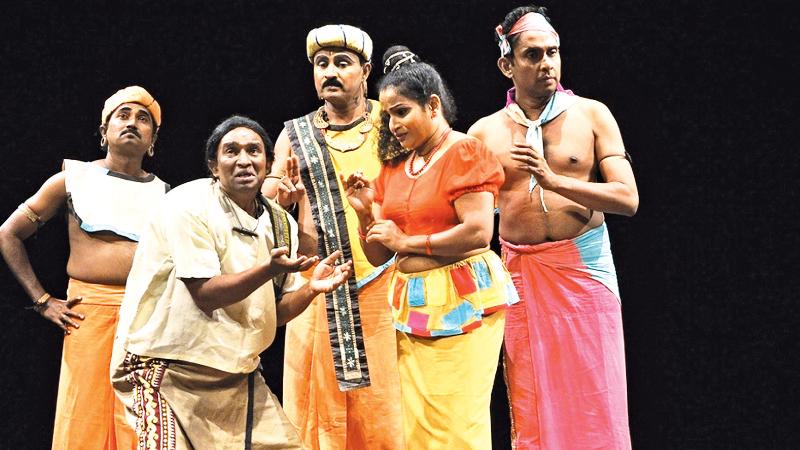
The Kalagola prashnaya which can translate to The case of Kalagola is a story that Sri Lankan children come to hear from elders. The name Kalagolaya in Sinhala culture has even come to mean a reference to the image of a dark, stout, unsightly man. A story that is part of the body of Buddhist literature known as ‘Jathaka Stories’ it resonates with many a sound lesson on human nature and the need for wisdom to prevail over oppressive laws and customs.
 On March 17, I sat in the gentle darkness of the Punchi Theatre in Borella to witness the classic Sinhala stage play Dikthala Kalagola come alive to the delight of theatregoers. Written by Punyasena Gunasinghe, Dikthala Kalagola is a dramatized musical rendition of the ‘Kalagola prashnaya’. The name of the play is formed of the principal character – Kalagola(ya) and his wife Dikthala who is stated in the story to be a great beauty. In the tradition of a Sinhala classic of the stage it is a musical which has a ‘potheguru’ or narrator who is shown in the form of a learned sage or scholar of olden times, who begins the narrative by giving the audience a glimpse of the background to the story and its setting. Choral singing as well as dialogue in song and verse is another feature of the text of this play.
On March 17, I sat in the gentle darkness of the Punchi Theatre in Borella to witness the classic Sinhala stage play Dikthala Kalagola come alive to the delight of theatregoers. Written by Punyasena Gunasinghe, Dikthala Kalagola is a dramatized musical rendition of the ‘Kalagola prashnaya’. The name of the play is formed of the principal character – Kalagola(ya) and his wife Dikthala who is stated in the story to be a great beauty. In the tradition of a Sinhala classic of the stage it is a musical which has a ‘potheguru’ or narrator who is shown in the form of a learned sage or scholar of olden times, who begins the narrative by giving the audience a glimpse of the background to the story and its setting. Choral singing as well as dialogue in song and verse is another feature of the text of this play.
Delivered on the strength of key elements of actors in elaborate period costumes, melodious singing, music and theatricalized gesticulations and movements that are meant to narrate challenging situations, such as, swimming across a river, Dikthala Kalagola presents a taste of classic Sinhala theatre built on minimalist principles. What one encounters in this production style is akin to the same mould of minimalist theatre features that characterize productions of the works of Prof. Ediriweera Sarachchandra.
Dikthala Kalagola is a play that has several memorable songs that have over the years gained popularity among young and old. Aale benda maage ramya wan sung by Kalagola to his bride is one such song that delights audiences, resonating an olden comedic folksy tone that is much loved.
The themes of Dikthala Kalagola are multilayered, in my opinion. Although it seems a play developed on a simple traditional story, there are several sociological aspects as well as socio-political aspects that can be gauged if keenly observed. At the crux of the dispute solving that is seen through the character of the wise Mahoshada (who is said to be one of the lives/incarnations of the Bodhisathwa on his journey through samsara to eventually become the Buddha) is how adjudication is done fairly and judgement delivered according to the law, but subsequent questioning of the moral correctness of traditional social orders is also brought forth to achieve ‘justice’ that is finally acceptable to the conscience of those involved in the dispute.
Dikthala who abandons her husband, to whom she was forcibly married off on arbitrary parental authority runs away with Dikpitiya and seeks to become his woman. She detests the unsightly Kalagola who performed domestic labours for her old parents and asked as his remuneration the hand of their daughter Dikthala. Dikthala in this story represents the typical daughter who is considered a chattel deprived of any individual rights. The union is an oppression from which the woman desperately seeks to escape. It is in another sense a comment on how ‘love cannot be bought’.
An utterly mismatched marriage where love is one sided and more so an infatuation by the man, of the physical beauty of the woman is thus brought to an amicable end with a sense of ‘female liberation’ being achieved. Between Dikthala and Dikpitiya there is a mutual attraction which shows potential for a union not fastened together by the imposition of the will of a higher authority. Thereby, this story is also one where the liberal idea that marriage ought to be based on mutual love shared between a man and a woman and not strict dictates of custom and law where one party (namely the woman) is forced into a union and forced to stay in such disliked union purely on the grounds of law alone.
Kalagola may be seen as the pathetic victim for whom there may be sympathy as he is the underdog. In making out his case he laments that he devotedly served Dikthala’s parents and ‘earned’ her hand and speaks of the extent of his love for Dikthala by citing how he was committed to performing domestic labours for several years. But, it also adds up to show how he saw Dikthala as a ‘purchasable object’ by means of securing her parents’ pledge to give her to him in marriage.
Kalagola thus shows his crass disregard for what actual feelings Dikthala would have as a human being. The wisdom of Mahoshada shows Kalagola’s aspirations were unsound and formed the basis for a rickety union that had all the markings of a marriage with no security of lasting long.
